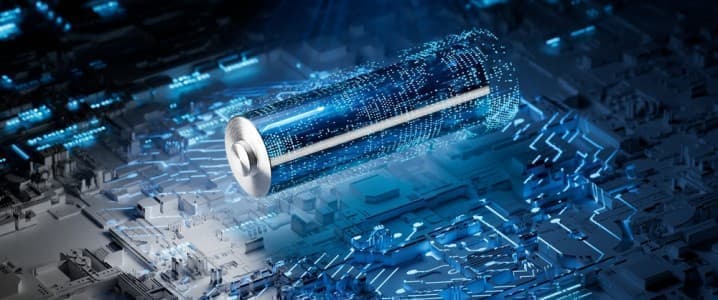Lithium-ion batteries face safety concerns as a result of internal separator issues which often lead to short circuits. Batteries employing the Incheon National separators demonstrated improved performance and reduced growth of disruptive root-like structures (dendrites), paving the way for high-safety batteries that can aid the adoption of electric vehicles and advanced energy storage systems.

Scientists have developed stable “separators,” a component that significantly affects the performance and safety of lithium-ion batteries. Image credit: knowablemag https://openverse.org/image/2314314c-541f-426c-929d-9442771b0aa0. License type: CC BY-NC-ND 2.0. For the largest and complete view click the press release link.
Lithium-ion batteries are a widely used class of rechargeable batteries in today’s world. One of the processes that can hamper the functioning of these batteries is an internal short circuit caused by direct contact between the cathode and anode (the conductors that complete the circuit within a battery).
To avoid this, separators composed of polyolefins – a type of polymer – can be employed to maintain separation. However, these separators can melt at higher temperatures, and the inadequate absorption of electrolytes (essential for conveying charges between electrodes) can result in short circuits and diminished efficiency. To tackle these issues, several different methods have been proposed.
One such method is to apply ceramic coatings on the separators to improve the way they handle pressure and heat. However, this can increase the thickness of the separators, reduce their adhesion, and harm battery performance.
Another technique is to use polymer coatings, in a process known as graft polymerization. This involves the attachment of individual units (monomers) to the separators to give them the desired qualities.
Now advancing research, the study published in Energy Storage Materials demonstrates successful graft polymerization on a polypropylene (PP) separator, incorporating a uniform layer of silicon dioxide (SiO2). The research results of the joint study conducted by a team of researchers, including Assistant Professor Jeongsik Yun from the Department of Energy and Chemical Engineering at Incheon National University, were featured in Volume 65 of Energy Storage Materials in February 2024.
Dr. Yun was motivated by the need for high-performance battery materials in electric vehicles to achieve longer driving ranges, an area he has been actively working on. Beyond improving battery performance, his goal is to ease consumer concerns about battery explosions, potentially influencing their decisions to embrace electric vehicles.
Dr. Yun explained, “Battery explosions are frequently initiated from the melting of a separator. The commercial battery separator is made of polyolefins, a class of polymers which are vulnerable to heat. We therefore aimed to improve the thermal stability of the commercial separators by coating them with thermally robust materials such as SiO2 particles.”
In this study, a PP separator was modified in several ways. Initially, it was coated with a layer of polyvinylidene fluoride, a chemical chosen to enhance electrolyte affinity and thermal stability, while also introducing grafting reaction sites. Then, the separator underwent grafting with methacrylate molecules, followed by a final coating with SiO2 particles.
These modifications made the separator stronger and more resistant to heat, suppressed the growth of lithium dendrites, and helped improve the cycling performance.
Additionally, the modifications not only preserved the energy storage of Li-ion batteries per unit volume, but also outperformed other coating methods in cell performance.
This technique thus shows promise for creating robust separators and advancing the use of lithium-ion batteries in electric vehicles and energy storage systems.
Dr. Yun noted how he envisions the results effects, “We hope that the results of this study can enable the development of high-safety lithium batteries. We believe that the thermal stability of these batteries will greatly benefit the current fire-sensitive electric vehicle field. In the long term, this can motivate people to choose electric vehicles and in urban areas, reduce the suffering of people from breathing in the polluted air generated by the internal combustion engines.”
**
This has to cheer up a lot of consumers concerned with battery fires. Its not just EVs, its electric assisted bicycles and other devices with larger battery sets. For many the idea of a large type of lithium-ion battery set is a non-starter. For some, the insurance providers are catching on to the risks. With the battery charger in the garage and an insurer declining to insure the EV and the home from an EV battery fire in the garage – it becomes a major item of concern that is coming soon.
This technology can’t come soon enough. One day the headline will be about how many folks died incinerated by their EV lighting off in the garage.
By Brian Westenhaus via New Energy and Fuel
More Top Reads From Oilprice.com:
- Can Anything Stop Bitcoin’s Bull Run?
- Oil Workers Fired As Strike Rages On in Kazakhstan
- Egypt Seals Historic $35 Billion Development Deal with UAE


















